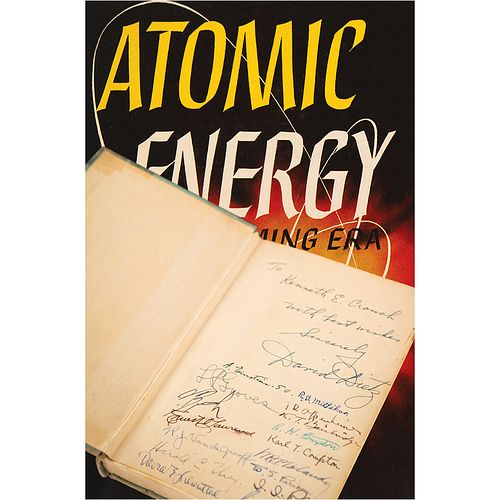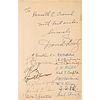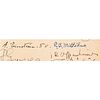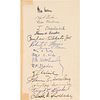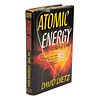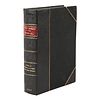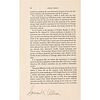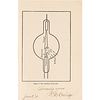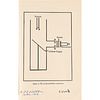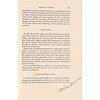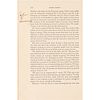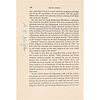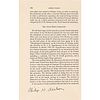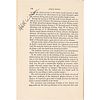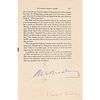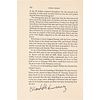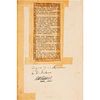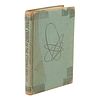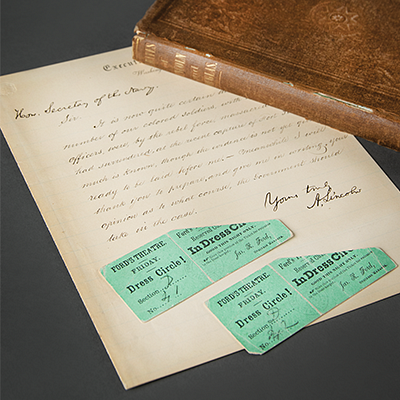Manhattan Project: Atomic Bomb Signed Book with Einstein, Oppenheimer, Bohr, Enola Gay Crew, Nobel Prize Winners, and Nuclear Researchers
Two ways to bid:
- Leave a max absentee bid and the platform will bid on your behalf up to your maximum bid during the live auction.
- Bid live during the auction and your bids will be submitted real-time to the auctioneer.
Bid Increments
| Price | Bid Increment |
|---|---|
| $0 | $5 |
| $50 | $10 |
| $200 | $25 |
| $500 | $50 |
About Auction
Sep 23, 2023
RR Auction support@rrauction.com
- Lot Description
Signed book: Atomic Energy in the Coming Era by David Dietz. Sixth printing. NY: Dodd, Mead & Company, 1949. Hardcover with dust jacket, 5.25 x 7.5, 184 pages. Signed on the endpapers and throughout by a remarkable 49 individuals, representing a who's who of 20th century physics—among these are 14 scientists awarded the Nobel Prize in Physics or Chemistry for their monumental achievements, as well as pioneering nuclear researchers, military personnel, and Manhattan Project organizers.
Signers include:
• Albert Einstein (Nobel Prize, helped to launch the American atomic bomb project with his famous 1939 letter to Franklin D. Roosevelt)
• Robert Millikan (Nobel Prize, determined the electron’s charge)
• J. Robert Oppenheimer (directed the atomic bomb project at Los Alamos)
• Ernest O. Lawrence (Nobel Prize, invented of the cyclotron which was used at Los Alamos)
• Leslie R. Groves (head of the Manhattan Project)
• Vannevar Bush (key figure in establishing the Manhattan Project)
• Robert Van de Graaff (invented the Van de Graaff particle accelerator which was used at Los Alamos)
• Harold Urey (Nobel Prize, discovered deuterium, worked on isotope separation leading to U-235)
• David Lilienthal (first chairman of the Atomic Energy Commission)
• K. T. Bainbridge (Harvard professor, in charge of detonation of first atomic bomb test)
• Arthur Compton (Nobel Prize, discovered the Compton effect, set up Chicago lab leading to plutonium production)
• Karl Compton (president of MIT, served on Interim Committee to determine atomic bomb policy)
• W. H. P. Blandy (US Navy Admiral, Commander-in-Chief, Atlantic and the Atlantic Fleet (CINCLANT), conducted the Bikini Atoll bomb tests)
• W. S. Parsons (directed the ordnance division at Los Alamos, led the bomb mechanism design team, flew as bomb commander on the Enola Gay)
• Isidor I. Rabi (Nobel Prize, Los Alamos consultant)
• Carl Spaatz (commanded air force in Pacific, directed bombings of Hiroshima and Nagasaki)
• Otto Hahn (Nobel Prize, co-discoverer of nuclear fission)
• Niels Bohr (Nobel Prize, worked at Los Alamos after being smuggled out of Sweden in 1943)
• Lise Meitner (co-discoverer of fission, refused to pursue military uses of fission)
• James Chadwick (Nobel Prize, discovered the neutron, led team of British experts working on the bomb in the U.S.)
• Thomas Ferebee (bombardier of the Enola Gay)
• Paul Tibbets, Jr. (pilot of the Enola Gay)
• Robert A. Lewis (co-pilot of the Enola Gay)
• George A. Caron (tailgunner of the Enola Gay)
• Hans A. Bethe (directed the theoretical physics division at Los Alamos)
• Alfred O. Nier (demonstrated that U-235 was the isotope responsible for fission, not U-238)
• G. B. Kistiakowsky (directed the explosives division at Los Alamos)
• R. F. Bacher (directed the bomb physics division at Los Alamos)
• George Weil (part of the Chicago research team, personally withdrew control rods from exponential pile, producing the first controlled nuclear chain reaction)
• Glenn Seaborg (Nobel Prize, discovered many transuranic elements)
• John Ray Dunning (led the Manhattan Project’s SAM Laboratories gaseous diffusion division for separating the U-235 isotope)
• Kermit Beahan (bombardier on the B-29 Bockscar which dropped the Nagasaki bomb)
• Charles Sweeney (pilot of Great Artiste, which flew in both the Hiroshima and the Nagasaki operations)
• Samuel Allison (director of the Chicago Met Lab and, starting in 1944, chairman of the Los Alamos Scheduling and Technical Committee, personally counted down the final seconds before the Trinity test)
• W. D. Coolidge (invented the Coolidge x-ray tube to accelerate electrons)
• E. T. S. Walton (Nobel Prize, invented, with Cockcroft, the first successful particle accelerator, later used at Los Alamos)
• J. D. Cockcroft (Nobel Prize, Cockcroft-Walton experiment, first experimental splitting of atomic nucleus)
• Carl Anderson (Nobel Prize, discovered the positron)
• H. D. Smyth (chairman of Princeton physics department, author of the Smyth Report on the development of the bomb)
• Eugene Wigner (Nobel Prize, theory of neutron absorption)
• Philip Abelson (developed the thermal diffusion method)
• Robert Wilson (directed the experimental nuclear physics division at Los Alamos)
• Norris Bradbury (head of assembly of the Trinity test bomb, replaced Oppenheimer as director of Los Alamos)
• Warren Magnuson (U.S. senator)
• Hyman Rickover (led the team that developed the Nautilus, the first atomic submarine)
• Eugene Wilkinson (first commanding officer of USS Nautilus)
• Richard Riddell (last commanding officer of USS Nautilus)
• David Dietz (author of this book, one of the best-selling early works on atomic energy)
• Doris Dietz Turner (wife of author, drew diagrams in book)
Autographic condition: overall fine, with old tape stains to gutters of signed endpapers. Book condition: G/VG, with some repairs and toned tape inside, dampstaining and tape to boards, and the supplied dust jacket clean and bright. Housed in a handsome custom-made half morocco clamshell case.
In his famous column 'The Bomb and Civilization,' published on August 18, 1945, Bertrand Russell observed: 'From the scientific point of view, the atomic bomb embodies the
results of a combination of genius and patience as remarkable as any in the history of mankind.' This remarkable compendium of autographs of the scientists and military men that played a role in the development of the bomb is an absolutely one-of-a-kind piece—an irreplaceable relic of the most momentous development of the 20th century. - Shipping Info
-
Bidder is liable for shipping and handling and providing accurate information as to shipping or delivery locations and arranging for such. RR Auction is unable to combine purchases from other auctions or affiliates into one package for shipping purposes. Lots won will be shipped in a commercially reasonable time after payment in good funds for the merchandise and the shipping fees are received or credit extended, except when third-party shipment occurs. Bidder agrees that service and handling charges related to shipping items which are not pre-paid may be charged to a credit card on file with RR Auction. Successful international Bidders shall provide written shipping instructions, including specified Customs declarations, to RR Auction for any lots to be delivered outside of the United States. NOTE: Declaration value shall be the item’(s) hammer price and RR Auction shall use the correct harmonized code for the lot. Domestic Bidders on lots designated for third-party shipment must designate the common carrier, accept risk of loss, and prepay shipping costs.
-
- Buyer's Premium



 EUR
EUR CAD
CAD AUD
AUD GBP
GBP MXN
MXN HKD
HKD CNY
CNY MYR
MYR SEK
SEK SGD
SGD CHF
CHF THB
THB